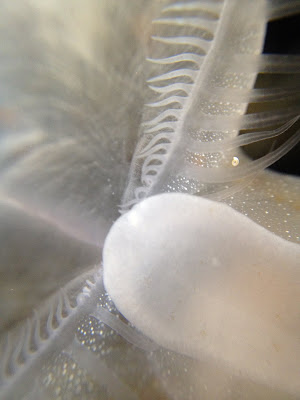Large-scale commercial fishing has, for years, been depleting fish-stocks in many places around the world - especially in coral reefs in the tropics. In response, several countries have designated certain areas of the sea as "marine reserves," where neither fishing nor other development is allowed. Now, a team of scientists from US and Australian universities has produced compelling new evidence . It shows these reserves have not only been helping stocks rebound, but are also protecting massive coral "food webs" - beds of sea-grasses and algae - important reservoirs for carbon storage. by Larry Powell In this satellite photo, "halos" appear as pale blue circular bands surrounding tiny dark spots. The spots are likely small patch reefs or other shelter for small fish and invertebrates that protect them from predators. Each halo is probably about 10 meters wide. The more there are, the healthier marine life there is likely






